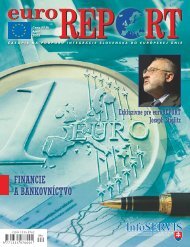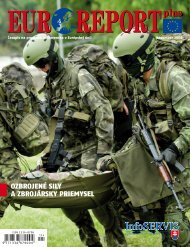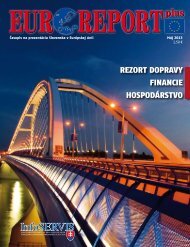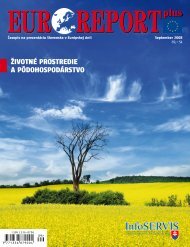EURÓPSKY PARLAMENT84cový postoj“. Podľa neho socialisti vždy podporovalia podporujú nové členské krajiny, noich cieľom je dosiahnuť sociálny pokrok a to,aby sa dodržiavali určité sociálne štandardy.Pracovníci z nových členských krajín pracujúciv inej členskej krajine majú mať podľa nehoprávo na rovnaké platové podmienky, akomajú občania danej krajiny.Graham WATSON (ALDE/ADLE, UK) zaliberálov vyjadril súhlas so stanoviskom EPP--ED. Voľný pohyb má byť podľa neho základom.„Nie sme proti škandinávskemu sociálnemumodelu, no jeho uplatňovanie nesmieviesť ku xenofóbii“. Švédske odbory podľa jehoslov neakceptovali fakt, že firma Laval chcelazvýšiť platy, ale požadovali od nej, aby sa ichvýška vyrovnala nie priemernému švédskemuplatu, ale štokholmskému. Blokáda Lavalua jej následný bankrot pritom podľa nehoneviedli k zlepšeniu platových podmienok zamestnancovtejto firmy, ale naopak, k stratezamestnania.Za skupinu zelených vystúpil švédsky poslanecCarl SCHLYTER (Verts/ALE, SE), ktorý savyjadril voči McCREEVYMU kriticky a uviedol,že svojimi výrokmi zaútočil na garantovanéprávo na štrajk. Aj ďalší švédsky poslanec,Nils LUNDGREN (IND/DEM, SE), za Skupinunezávislosť/demokracia sa zastal Švédskehomodelu.Francis WURTZ (GUE/NGL, F) z Európskejzjednotenej ľavice/Nordickej zelenej ľavicevyjadril svoj súhlas s postojom Strany európskychsocialistov. Brian CROWLEY (UEN, IE)zo skupiny Únie za Európu národov kritizovalcelú diskusiu, pretože podľa neho ide viaco mocenskú hru a nie o poriadnu debatuna tému základných princípov. Vo svojomprejave sa zastal postoju Komisie, ktoré sapodľa neho v tomto prípade iba pridržiavav súčasnosti platných pravidiel vyplývajúcichzo zmlúv a obvinil Švédsko, že sa snaží naposlednú chvíľu zmeniť svoj postoj k navrhovanejsmernici o službách.Štipendium populárneho programuErazmus sa zdvojnásobíPoslanci na zasadnutí 25. októbra 2005 pomeromhlasov 549 za, 47 proti a 23 absenciíodsúhlasili správu, ktorá vyzýva na zdvojnásobenieštudentského štipendia poskytovanéhov rámci programu Erazmus. V súčasnosti jevýška tohto štipendia 150 eur mesačne, čo bysa v budúcnosti malo zmeniť, vzhľadom najmäna rastúce životné náklady. Erazmus patrímedzi základné podprogramy EÚ v oblastivzdelávania, a až doposiaľ z neho benefitovaloviac než milión študentov. Predpokladá sa,že ich počet sa do roku 2013 zdvojnásobí.Plénum Európskeho parlamentu schválilov prvom čítaní správu o návrhu akčnéhoprogramu v oblasti celoživotnéhovzdelávania na roky 2007-2013.Zahŕňa programy Erazmus, Leonardo,Comenius, Grundtviga Jean Monnet. Poslanci okrem iného požadovalizdvojnásobenie základného štipendiaErazmus.V súčasnosti je výška finančnej podpory preštudentov študujúcich v zahraničí 150 eur mesačne,suma, ktorú spravodajkyňa Doris PACK(EPP-ED, DE) označila za „obzvlášť znepokojujúcu“,najmä vzhľadom na fakt, že aj naprieknarastajúcim životným nákladom sa populárneštipendium z programu Erazmus od roku 1993nezmenilo. Poslanci teda navrhujú zvýšenie zosúčasných 150 eur na 210 eur mesačne v roku2007 a 300 eur mesačne v roku 2013.EP sa tiež vyslovil za navýšenie dlhodobéhocelkového rozpočtu pre všetky programyo ďalších 757 miliónov eur. Cieľom je zvýšeniepríspevkov na nadnárodnú mobilitu vysokoškolákov,žiakov stredných škôl a učiteľov, akoaj príspevkov určených na výmenné školsképobyty.Navrhované navýšenie je v súlade s pozíciouParlamentu ohľadom nasledujúcehodlhodobého rozpočtu EÚ. Správa poukazujena to, že rozpočtové prostriedky uvedenév návrhu Komisie na obdobie po roku 2006závisia od prijatia rozhodnutí o tomto viacročnomrozpočte Únie.V oblasti odborného vzdelávania a prípravy,ktorú podporuje program Leonardo daVinci, súhlasil Parlament s miernym zníženímpodielu na celkovom rozpočte. Návrh Komisie,aby bolo v roku 2013 možné umiestniť150 000 učňov, označila spravodajkyňa za„príliš ambiciózny“. Mesačné náklady naumiestnenie sú v prípade programu Leonardo(3 644 eur), oproti nákladom v rámci Erazmu(1 775 eur) oveľa vyššie.Zvýšiť by sa mala účasť žiakov a učiteľov napodprograme Comenius. Ten bol vytvorenýpre žiakov stredných škôl. K jeho cieľom zároveňpatrí aj podpora regionálnej spolupráce.Preto má v rámci tohto programu vzniknúťnový podprogram Comenius-Regio, zameriavajúcisa na cezhraničnú mobilitu učiteľov,obzvlášť medzi školami v susedných regiónoch.Počas trvania programu by malo byťdo programu mobility zapojených približne10 000 žiakov vyšších ročníkov stredných škôla tiež približne 10 000 učiteľov.Ďalšie návrhy sa týkali zjednodušenia postupupre získanie štipendia, zabezpečeniavýučby oficiálnych, regionálnych a menšinovýchjazykov, výučby najmenej dvoch cudzíchjazykov, vyšších štipendií zdravotne postihnutýmobčanom a podpory znakovej reči, ako ajBraillovho písma.Rezolúcia EP k vtáčej chrípkeVzhľadom na aktuálnosť problému vtáčejchrípky a jej výskyt v Európe prijal 26. októbra2005 Európsky parlament uznesenie o stratégiizameranej proti chrípkovej pandémii.Poslanci v ňom upozornili najmä na nutnosťzlepšenia koordinácie na celoeurópskej úrovnia členské štáty vyzvali na vypracovanienárodných plánov pripravenosti.Poslanci v rezolúcii upozornili na nutnosťvypracovania „predbežných ustanovení prenúdzové plány v prípade nakazenia človeka“.Tie by sa mali okrem iného zamerať na zabezpečeniepotrebnej koordinácie medzi členskýmištátmi; zabezpečenie výmeny informácií soštátmi, ktoré nie sú členmi EÚ; identifikáciuoblastí, ktoré by boli izolované ako prvé; určenieskupín obyvateľstva, ktoré majú mať prioritupri očkovaní; zabezpečenie spravodliveja univerzálnej distribúcie protiepidemickýchliekov a poskytnutie efektívnej informačnejstratégie pre verejnosť.Prijatý text tiež vyzýva Radu, aby dospelak dohode ohľadom plánov pripravenosti nachrípku, ktorá zabezpečí ich záväznosť prevšetky členské štáty. Tieto plány by maliobsahovať predbežné nákupné zmluvy na zabezpečeniezásob potrebných liekov. Komisiamá zas členským štátom poskytnúť potrebnétechnické poradenstvo pri vypracúvaní týchtoplánov a tiež informovať Európsky parlamento aktuálnych stavoch zásob vakcín.Rezolúcia tiež vyzýva Komisiu a členské štáty,aby zvýšili svoju podporu krajinám, ktorésú v súčasnosti najviac zasiahnuté vírusomvtáčej chrípky a aby podporili program očkovaniavšetkých chovateľov hydiny v krajináchpostihnutých vtáčou chrípkou s vedomím, žetíto pracovníci sa nachádzajú na jednom z najvýznamnejšíchrozhraní medzi vírusom ľudskeja vtáčej chrípky, na ktorom by mohol vzniknúťkmeň spôsobujúci celosvetovú pandémiu.Poslanci vyzvali Komisiu a členské štáty ajna spoluprácu s farmaceutickým priemyslom,aby sa dali podnikať nevyhnutné kroky navýrobu nových vakcín. Osobitnú pozornosťmá venovať členských štátom, ktoré saminevyrábajú vakcíny, ani antivirotiká. Členskéštáty majú pred vypuknutím pandémiezvýšiť počet očkovaní proti chrípke v súlades odporúčaniami WHO, a pamätať na to, ževytváranie zásob vakcín a antivirotík v súvislostis pandémiou bude menej nákladné, nežstraty na ľudských životoch po jej vypuknutíbez použitia vakcín.Z dôvodu odlišných finančných rezerv členskýchštátov na nákup vakcín a antivirotík EPnavrhuje, aby Komisia posúdila možnosť použitiafondu solidarity EÚ na tieto účely, akoaj na výrobu nových vakcín a vývoj novýchtestovacích metód.Kontakt:Zuzana Andrejčáková,Slovenský tlačový sektorEurópsky Parlament, Directorate-General forInformation, Press UnitOffice:BXL - PHS 06A018: Tel.: 0032/2 283 21 19,STR - IP3 F03009: Tel.: 0033/3 881 766 73mail: TlacoveOddelen-sk@europarl.eu.int
SUMMARYSUMMARYExcerpt from an Interview with theMinister of Defence of the SlovakRepublic, Juraj LiškaA few weeks ago, the last recruitswent to the National Service in theSlovak Army. There were less recruitsin comparison with preceding yearsbut it is not linked to the demographictrend in Slovakia only.Sure, the professionalization of thearmed forces is one of the most discussedtopics not only in Slovakia but in numberof other European countries. The matteris in the trend which has been manifestedsince the fall of Berlin Wall in 1989.Slovakia made the decisive step towardsthe creation of the professional army by myministerial resolution which discontinuedthe recruitment for the performance ofthe National Service. Our committmentconfirmed by the Parliament was to buildup the professional army by the end of2006. I have an analysis made to find outwhether it is possible to accelerate thisprocess. The answer of my colleagues wasyes but under several conditions. First ofall, I had to duly solve the problem of whatto do with the activities performed by therank and file in the National Service. Thetalk is about cooking, tiding, guardingand other activities. Further on, we had tocomplete the relevant legislation becausethe transition to professional armed forcesis connected with drafting and amendinga number of acts and regulations. Thetrends in staffing the positions in the armyby military professionals are also of greatimportance. And, last but not least, wehad to find sufficient resources to fund thegiven process. The media and the publicmade a pressure on me by asking me fora prompt answer to whether it is possibleto have professional army earlier than inJanuary 2007. I understand pretty welltheir attention but it is a very sensitivetopic. We had to consider a lot of interlinkedquestions therefore the final resolution tooka little bit more time.Some citizens do not perceive theprofessionalization of the armyproperly. They talk about themercenaries who are too costly forthe State budget. Could you explainthe difference between the soldiersperforming their National Service andthe professionals?To say simply: the service in theprofessional armed forces is voluntary.As for the National Service many peoplehave performed it only by force. Theirattitude towards to the fulfilment ofduties have been corresponding to thisfact. The professionals are different. Forthem the service is work, challenge andmission. This is the basic difference. We arebuilding professional, well trained, armedand equipped army able to intervenewithin the entire range of military andnon-military threats. I have in mind notonly global conflicts but also new era‘schallenges such as terrorism, humanitarianand natural disasters, defence of strategicobjects, combat operations for the defenceof democracy in any place throughout theworld. This is only a small portion of the realtasks to be fulfilled by military professionals.They are ready to fulfill them thanks to themulti-facetted training - which starts bypreparing the staff for combat activitiesand ends by exercising for the assistance tothe population threatened by disaster.As for the resources, we want toachieve higher quality for the sameamount of money. At the very beginningmore significant investment is necessary.However, in the long term, the professionalarmy is more efficient. Just to give anexample: a soldier signs a contract forthree years. He will be trained as a driverof armoured vehicle. In the condition ofthe National Service six conscripts shouldbe trained in the same time which impliesmore costs and less quality.Excerpt from an Interview with StateSecretary at the Ministry of Defence ofthe Slovak Republic, Martin FedorIn what parts of the world and withinwhat operations do the troops of theSlovak Army perform their mission- I mean their activities in the threecontinents - Europe, Africa and Asia?We live in the era of global threats- represented namely by terrorism andthe weapons of mass destruction which,at present, easily cross the border andare beyond any limits. It is necessary tosolve the crises on the place where theyare generating and not to wait until theirconsequences pass to our territory. After weentered the NATO and the European Unionthe defence of Slovakia became inseparablefrom that of our allies. The armed forcesare being transformed into multiserviceones capable to cover much larger scopeof activities. In the past, the army was builtfor the defence of territory. Nowadays, weneed the army for defending our intereststhere where they are threatened - it meansabroad.At present, Slovakia has almost 600soldiers in fourteen operations abroad.They are active in the operations of crisismanagement mainly in the stability keepingoperations aimed at maintaining the peacein the Balkans, Afghanistan and Iraq. Largerpeacekeeping troops operate in Cyprus andthe Golan Heights.Until now the operations of our troopsabroad have been mostly focused onhumanitarian aspects. However, the futurewill require their mobilization for theentire range of operations within NATO.Also a nature of international mandatefor their intervention abroad may alter inparticular events. In 2008 we are to jointhe NATO Immediate Response Forces andin 2010 the EU combat group which is nowbeing built by common efforts of Poland,Germany, Lithuania and Latvia.The armed forces and the public must beduly prepared for our new ambitions andresponsibilities. Activities of our soldiersabroad contribute primarily to the solutionof dangerous situations. At the same timethey make the prestige of Slovakia and itstroops higher. Mobilizing the Slovak Armywith its allies also increases its ability tointeroperate and coordinate the efforts withthe best armies of today‘s world associatedin NATO. High benefit of the operationsabroad is the practical experience acquiredand the language skills improvement whichwill have their impact on the training of allthe armed forces.Is there a sufficient interest in theactivities abroad among the soldiers?Today we observe sufficient interest inoperating abroad. Staffing the ranks ofnon-commissioned officers and officercadets is without problems. Staffing theranks of officers is problematic, until nowwe have not succeeded to balance the ranksand professions required with the functionsin the missions abroad. The interestof soldiers in these missions positivelyresponded to the increase of bonus forservice abroad. For the future, the missionabroad will be an inseparable part ofa professional soldier‘s career. Pursuant tothe new Act on Civil Service of ProfessionalSoldiers, each professional performingthe civil service shall consent withits performance according tothe needs of the armed forces.These needs also comprise the85
















